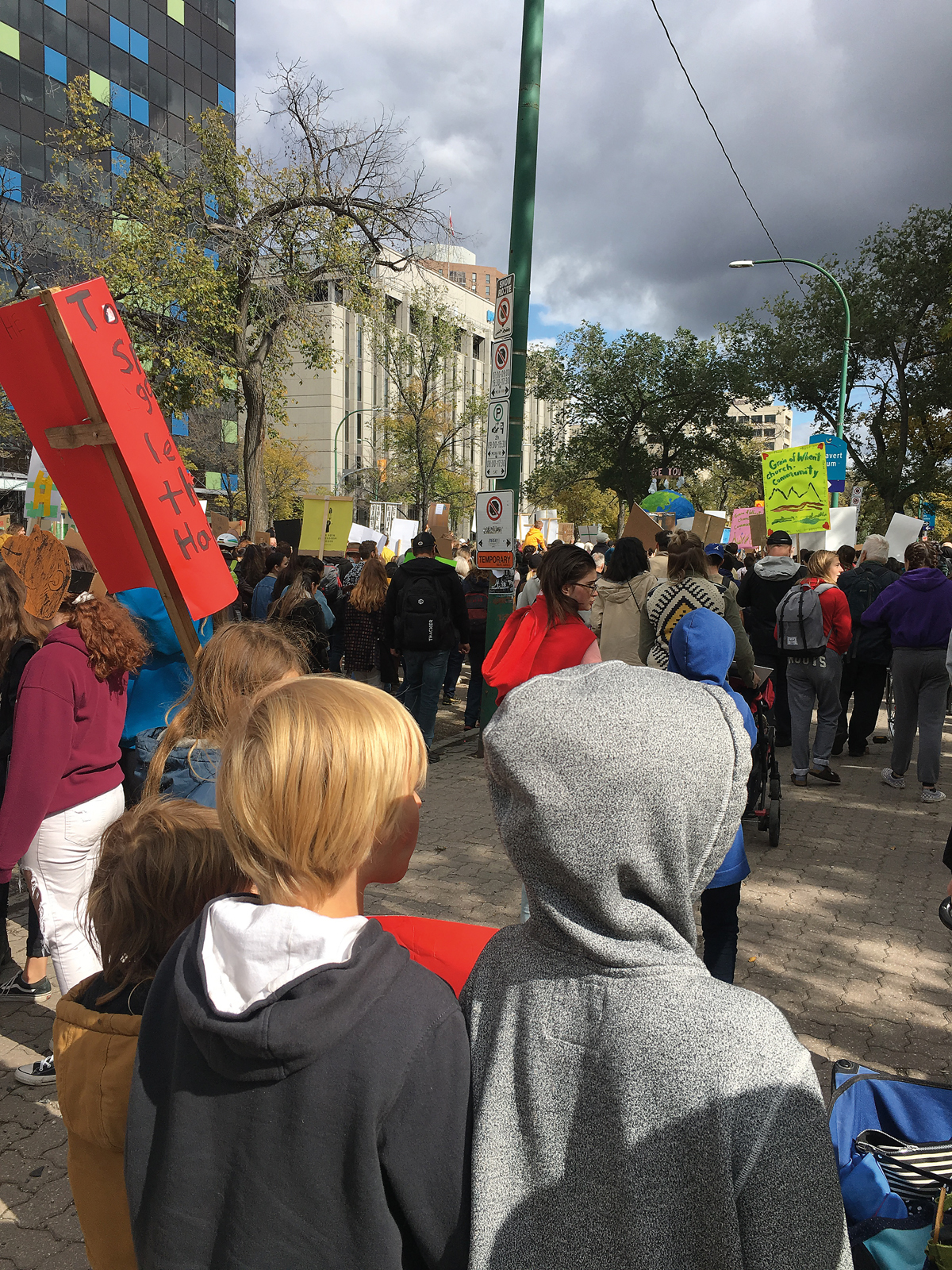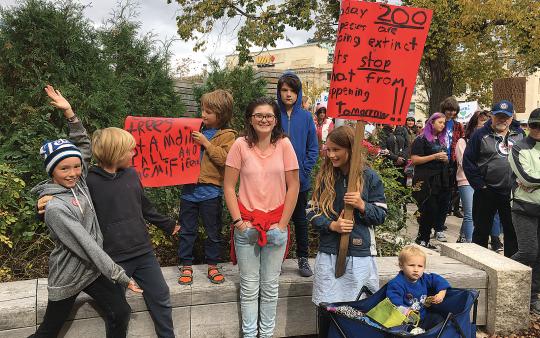In the past 18 months, the youth-led climate change movement has flourished. Greta Thunberg has become a household name and millions of youth around the globe have participated in climate strikes, demanding swift action on the climate crisis, inspiring millions more to join. Perhaps your child has even taken part in one of these strikes.
With more young people joining climate change-focused groups every day, how can we, as parents, support our child’s involvement in this important movement?
Socially engaged kids need emotional support
Information about the urgency of addressing climate change is increasingly available on the news, on social media, and at times discussed in the classroom, notes Kalila Badali, a registered psychotherapist (qualifying) who works with The Toronto Counselling Centre for Teens. This awareness can lead to feelings of anxiety about the future and, in some youth, hopelessness. These are natural reactions to a threatening issue, and if your child is experiencing angst about climate change, listening can make a world of difference. Sometimes all it takes is validating their concerns, empathizing with them, showing curiosity, and supporting them to help alleviate some of the big thoughts that can consume their minds.

Look for signs of more serious impact, such as receding from friends or no longer enjoying things they used to, especially if your child has had previous issues such as depression, struggles in school, or social isolation. If these issues emerge or recur, Badali recommends seeking professional support, as this provides another adult who can listen and “offer an opportunity to assist youth in developing the capacity to cope with this reality and enable them to continue living effectively in accordance to their values.”
How children's anxiety affects youth activism
Although these feelings of fear for the future can have negative effects, Badali says they are also spurring youth to take action, which can be beneficial to their development, as involvement in activism and change-making can replace feelings of hopelessness with ones of empowerment. “Political engagement and standing up for what you believe in is excellent for developing a sense of agency, belonging, and efficacy in the community.”
For Sayuri, a grade 12 student who strikes every Friday, the transition from anxiety about the future to taking action came when she asked herself, “How do I create sincere impact?” Inspired by the “frankness” of youth climate activists, Sayuri regards being active in the movement as highly important personally. “I need to live. I can't continue on knowing that if we aren't making targeted change, my generation's quality of life will be abysmal regardless of the height of our grades, or cleanliness of our rooms,” she said.
Be engaged, attentive, offer help where you can, and encourage meaningful involvement
As a parent, you can help by providing emotional support. Climate striking youth need “a caring and supportive guardian, understanding of their independence, desire for community, and climate change,” Sayuri explains. She urges parents to “be engaged, attentive, offer help where you can, and encourage meaningful involvement.” Further, Badali suggests discussing the value of self-care with your child. Taking a break from the movement is okay, she advises. It doesn’t mean that they no longer care about climate change or are letting down the planet. Even seasoned activists can suffer from burnout and making time for self-care better enables your child to continue effective activism. Sharing your own self-care tips for handling stress can both be helpful and lead to valuable bonding.
Self-care activities for climate-change activists
Whether you're 9 or 99, prioritizing self-care is an effective and beneficial way to reduce stress, relax, and recharge. Some simple suggestions for self-care include:
-
being in nature
-
meditation
-
gentle exercise
-
gratitude journaling
-
spending time with loved ones

Climate change protests and school
It’s a scary world out there and the thought of letting your child actively protest can be daunting. Badali recognizes that a child’s safety is a legitimate concern for parents and counsels them to get involved themselves, do their homework, and learn more about the group their child is involved in, as well as researching safe protesting. She also advises parents to open a non-judgemental dialogue about safety to prompt their child to reflect on protesting. Questions you can ask include: What do you think the protest will be like? Do you have to stay through the whole protest? How will you help yourself if you feel overwhelmed? Focusing on the courage your child is displaying by taking part in climate strikes will help you address any hesitance or questions about safety you may have, Badali adds.
If missing school is a concern, Badali recommends considering whether the benefits of the experiential learning striking provides, like focusing on collective change, outweighs school attendance. If your child is struggling in school or missing important assignments and tests, consider incentivizing homework completion and studying as ways to be able to participate in climate strikes. As in the case of Caleb, a grade 10 student, striking up an agreement could work. He says his parents made a deal with him that “if I can make it to class every day on other weekdays and continue to catch up on any missed work on Fridays, I am allowed to go and support the cause.”
Environmental activism and parenting
As a parent who is deeply concerned about climate change, it can be distressing if your child shows no interest in taking part in the youth climate movement. Of course, pressuring a child to take part in something they don’t want to do is likely to backfire. Instead reflect on how climate change is discussed in the home. Is the talk often fatalistic with little discussion of the solutions and opportunities? According to Badali, focusing primarily on the problem of climate change can lead some youth to feel overwhelmed and seek protection from an emotionally heavy subject. Listening without judgement, increasing your child’s connection to nature, and fostering their curiosity about the natural world are great ways to build a shared value between both of you.
Organization can be challenging and disorganized at times, but what your child is doing has a legitimate cause and is legitimately valiant
Supporting your socially engaged child legitimizes their passion and enables them to move from just dreaming to actually doing, building confidence and maturity. According to Sayuri, “Organization can be challenging and disorganized at times, but what your child is doing has a legitimate cause and is legitimately valiant.” Caleb agrees, noting that, “Our planet is dying. If we don’t make big changes to the way we do things soon, the oceans will reach devastating levels, glaciers will melt, our forests will die, and we will go into poverty.”
Today’s climate striking youth are at the forefront of the human action that will be crucial if there is any hope of preventing these dire predictions, so promoting their innate desire to learn and be involved can keep them engaged for the long haul. Whether you offer a listening ear, create open dialogues, join in the cause too, or even give material and financial support, use these opportunities to encourage your child to grow their altruistic spirit!
You may also enjoy: Why Children Need to Know About Climate Change, Nurturing Environmental Leadership in Children, and Raising Kind Children Through Environmental Sustainability.








